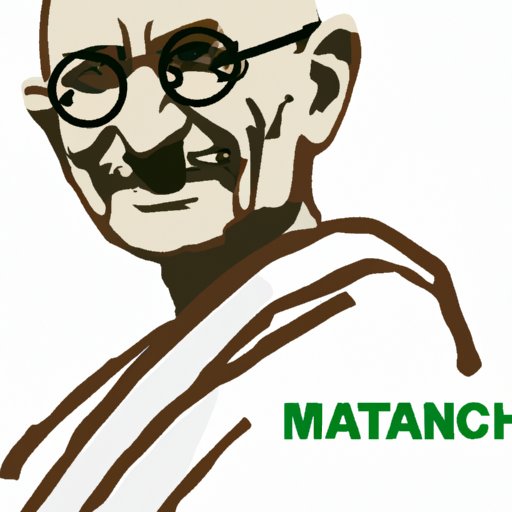Introduction
Mahatma Gandhi is one of the most influential figures in modern history. He is widely regarded as a great leader who championed nonviolence and human rights, and he inspired generations of activists and leaders around the world. But what was it that made Gandhi such a good leader? This article will explore the leadership of Mahatma Gandhi and what made him a good leader.
Analyzing Gandhi’s Leadership Style
Gandhi was an advocate for nonviolence and self-sacrifice, and he was able to inspire others with his leadership. He believed in the power of peaceful protest and nonviolent resistance, and he was committed to the cause of human rights and social justice. Here are some of the aspects of Gandhi’s leadership style that contributed to his success.
Emphasis on Nonviolence
Gandhi was a firm believer in the power of nonviolence. He believed that violence only begets more violence, and that the only way to achieve lasting peace was through peaceful means. He used nonviolence as a tool to challenge the oppressive British rule in India, and he encouraged others to do the same.
Practice of Self-Sacrifice
Gandhi was known for his willingness to make personal sacrifices for the greater good. He was often willing to put himself in danger in order to make a point or draw attention to an issue. For example, he famously went on hunger strikes in order to protest injustice and oppression.
Ability to Inspire Others
Gandhi had a remarkable ability to inspire others with his words and actions. He was able to rally people together and motivate them to take action. He was also able to bring different groups together, including Hindus and Muslims, as well as people from different socio-economic backgrounds.

Exploring His Use of Nonviolent Resistance
Gandhi was a masterful strategist when it came to using nonviolent resistance to challenge British rule in India. He organized several large-scale demonstrations, including the famous Salt March of 1930. He also encouraged Indians to take part in civil disobedience campaigns, such as boycotting foreign-made products, refusing to pay taxes, and refusing to cooperate with the British government.
Noncooperation with British Rule
Gandhi called for Indians to practice noncooperation with the British government. This included refusing to obey unjust laws, refusing to participate in elections, and refusing to accept the authority of the British Raj. This was a powerful form of protest that helped to weaken British control over India.
Salt March and Other Demonstrations
Gandhi organized several large-scale protests against the British government, including the famous Salt March of 1930. This march was a peaceful demonstration against the British monopoly on salt production. Thousands of people marched with Gandhi to the sea to collect salt, in defiance of the British law. The march was a powerful symbol of nonviolent resistance, and it helped to inspire other activists around the world.
Examining His Commitment to Human Rights
Gandhi was a passionate advocate for human rights. He believed in the equality of all people, regardless of race, religion, or gender. He was also a strong supporter of women’s rights, and he worked to promote education and employment opportunities for women. He was also committed to preserving Indian culture and traditions.
Equality for All Indians
Gandhi believed that all Indians should be treated equally, regardless of their religion, caste, or gender. He worked to end the caste system and to promote equal rights for all Indians. He also fought for the rights of religious minorities, such as Muslims and Sikhs, who were often discriminated against by the British.
Promotion of Women’s Rights
Gandhi was a strong supporter of women’s rights and he worked to promote education and employment opportunities for women. He also campaigned against child marriage and advocated for the abolition of the dowry system. He believed that women should have the same rights and opportunities as men.
Preservation of Indian Culture
Gandhi was a passionate defender of Indian culture and traditions. He believed that the British had tried to erase Indian identity, and he fought to preserve Indian customs and beliefs. He also encouraged Indians to take pride in their culture and to resist attempts to suppress it.

Discussing His Impact on Indian Independence
Gandhi played a key role in the struggle for Indian independence. He was a leader of the Indian Nationalist Movement and he was instrumental in negotiating Indian independence from the British. He was also able to rally people together and inspire them to take action.
Participation in the Indian Nationalist Movement
Gandhi was a leader of the Indian Nationalist Movement, which sought to end British rule in India. He organized large-scale protests and civil disobedience campaigns, and he was able to rally people together and inspire them to take action. He was also able to bring different groups together, including Hindus and Muslims, as well as people from different socio-economic backgrounds.
Role in Negotiating Indian Independence
Gandhi played a key role in negotiating Indian independence from the British. He was able to convince the British government to grant India independence without resorting to violence. He was also able to persuade other nationalist leaders to accept a compromise that allowed India to remain unified.
Examining His Beliefs in Religious Tolerance
Gandhi was a strong proponent of religious tolerance and coexistence. He believed that all religions should be respected and that people of different faiths should be able to live together in harmony. He was also a proponent of interfaith dialogue and understanding.
Respect for All Religions
Gandhi believed that all religions should be respected and that people of different faiths should be able to live together in harmony. He was a strong advocate for religious tolerance and he believed that people of different faiths should be able to peacefully coexist.
Promotion of Interfaith Dialogue
Gandhi was a proponent of interfaith dialogue and understanding. He believed that people of different faiths should be able to discuss their differences in a respectful manner. He also believed that people of different faiths should be able to work together to promote peace and understanding.
Investigating His Role in the Civil Rights Movement
Gandhi had a significant influence on the American civil rights movement. His philosophy of nonviolence and peaceful protest inspired African American leaders, such as Martin Luther King Jr., who cited Gandhi as a major influence on his own activism.
Connection to Martin Luther King Jr.
Martin Luther King Jr. was heavily influenced by Gandhi’s philosophy of nonviolence and peaceful protest. King credited Gandhi with inspiring his own activism, and he even visited India in 1959 to learn more about Gandhi’s methods. King also adopted many of Gandhi’s tactics, such as organizing large-scale peaceful protests.
Influence on African American Leaders
Gandhi’s philosophy of nonviolence and peaceful protest had a profound influence on African American leaders. His teachings inspired many African Americans to organize nonviolent protests and civil disobedience campaigns in order to challenge racial discrimination and segregation.

Exploring His Legacy of Social Change
Gandhi had a lasting impact on the world. His philosophy of nonviolence and peaceful protest led to political and social transformation in India and around the world. He also inspired future generations of activists and leaders, and his legacy lives on today.
Political and Social Transformation
Gandhi’s philosophy of nonviolence and peaceful protest led to political and social transformation in India and around the world. His successful campaign for Indian independence served as an inspiration to other countries fighting for freedom and self-determination. His use of nonviolent resistance also helped to bring about social change, such as the end of racial segregation in the United States.
Inspiration to Future Leaders
Gandhi’s legacy continues to inspire future generations of activists and leaders. His philosophy of nonviolence and peaceful protest has been adopted by numerous movements around the world, from the civil rights movement in the United States to the anti-apartheid movement in South Africa.
Conclusion
Mahatma Gandhi was a remarkable leader who changed the world with his philosophy of nonviolence and peaceful protest. He was committed to the cause of human rights and social justice, and he was able to inspire others with his words and actions. His legacy of social change continues to this day, and his example of leadership is still relevant today.
(Note: Is this article not meeting your expectations? Do you have knowledge or insights to share? Unlock new opportunities and expand your reach by joining our authors team. Click Registration to join us and share your expertise with our readers.)
